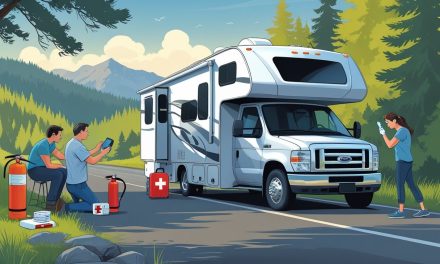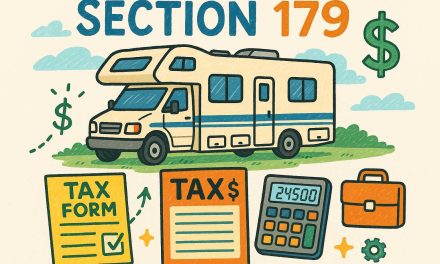Shopping for an RV online can lead to costly scams if you’re not careful. One buyer lost $22k after falling for a fake motorhome deal on Facebook Marketplace. This guide will show you how to spot red flags and avoid fraudsters.
Keep reading to protect your money—and your dream trip.
The $22K RV Scam: What Happened
Online RV scams are real—and Bill Thomas learned this the hard way. The Florida resident lost $22,650 while trying to buy a 2014 Winnebago listed on Facebook Marketplace for $22,500.
A seller claimed it was a repo repossessed vehicle priced low for a quick sale.
Thomas received an invoice and purchase agreement with delivery costs included, making the deal seem legit. Everything happened online—no showroom visits or in-person checks were allowed.
Following wire transfer instructions, he sent the full amount… but the motorhome never arrived. Later, he discovered Florida Recreational Marketing’s name had been used fraudulently—scammers even built a fake website to seal the deception.
It looked so official until reality hit, Thomas later shared about his ordeal with authorities.
Common Tactics Used by Scammers in Online RV Sales
Scammers often use clever tricks to fool RV shoppers. Here’s how they operate in online marketplaces.
- Fake listings lure buyers with unusually low prices—like claiming the RV is a repossession or quick sale. The $22k scam used this tactic to rush buyers into making hasty decisions.
- Fraudulent sellers change contact details frequently. In the $22k scam, the phone number shifted from a 407 area code to a disconnected 386 line.
- Bait and switch tactics involve showing one RV in photos but delivering something different—or nothing at all. Scammers bank on buyers not verifying details.
- Fake websites mimic real businesses to appear trustworthy. The $22k scammer copied a legitimate company’s name and created a phony site with a false address.
- Pressure to wire money quickly is a major red flag. These scammers insist on online-only deals, avoiding in-person meetings or inspections.
- No physical showroom means you can’t see the RV beforehand. The scammer behind the $22k loss refused to meet, claiming everything had to be done remotely.
- Phishing attempts may ask for personal info under the guise of verifying identity. This can lead to identity theft or financial fraud.
Red Flags to Watch for When Shopping for an RV
RV scams can happen to anyone—but spotting warning signs early helps avoid costly mistakes. Here are key red flags to watch for when shopping for an RV online.
- Sellers refuse to meet in person or allow inspections. A legitimate seller will let you view the RV before buying. No physical address or excuses about inspections mean trouble.
- Payment requests involve wire transfers or gift cards. Scammers often push for untraceable payment methods. Facebook Marketplace scams commonly use these tactics, according to the BBB.
- Phone numbers change or get disconnected. If the seller’s contact info suddenly stops working, it’s a major discrepancy. Verified sellers keep consistent communication.
- The deal seems too good to be true. Unrealistically low prices signal fraud. Always compare listings to spot unusual bargains.
- Pressure to pay quickly. Scammers rush buyers to prevent scrutiny. Take time to verify the seller’s authenticity before sending money.
- Marketplace listings lack seller verification. Platforms like Facebook don’t vet sellers. Check reviews and profiles for signs of legitimacy.
- Inconsistent details in the listing. Mileage, photos, or descriptions that don’t match raise suspicion. Cross-check every detail carefully.
- No paperwork or vague ownership history. Fraudulent sellers avoid providing titles or maintenance records. Demand clear documentation.
- Seller avoids video calls or live walkthroughs. Scammers may use stock photos or fake videos. Insist on real-time verification.
- Negative reviews or complaints about the seller. Search the seller’s name online. Past scams or unresolved disputes are clear warnings.
Tips to Verify the Seller’s Authenticity
Spotting red flags is just the first step—verifying a seller’s credibility is key to avoiding scams. Follow these practical tips to ensure trustworthiness and protect your investment.
- Check the seller’s transaction history on platforms like Facebook Marketplace. A long, active history with positive feedback boosts credibility and signals a legitimate seller.
- Read reviews or ratings from past buyers. Look for detailed feedback about the seller’s communication, honesty, and the condition of sold items.
- Keep all communication within the platform for record-keeping. Avoid moving discussions to external sites or email, where scam risks increase.
- Cross-check the seller’s provided address and business details. Verify if the company name matches the actual business at the listed location.
- Look for inconsistencies in the seller’s story. Scammers often slip up—confirm details like ownership history, vehicle condition, and pricing.
How to Safely Make Payments for Big-Ticket Items
Once you’ve verified the seller’s authenticity, payment security becomes the next critical step. The Better Business Bureau advises limiting upfront payments—never send large sums before inspecting the RV in person.
Wire transfers and gift cards are risky; opt for secure, traceable payment methods instead.
Would you like to save this article?
Use escrow services for added buyer protection—they hold funds until you confirm the item’s condition. Always complete transactions only after purchase verification and a thorough inspection.
Fraud prevention starts with due diligence—choose trusted platforms with built-in safeguards for big purchases like RVs. Secure payments reduce risk, so prioritize methods offering dispute resolution or reimbursement options if something goes wrong.
Tools and Platforms to Help Avoid Scams
Making secure payments is just one piece of the puzzle—you also need the right tools to spot scams. These platforms and resources help verify sellers and flag fraudulent activity.
- Facebook Marketplace offers seller transaction histories along with user reviews and ratings. Check these before buying to gauge trustworthiness.
- The Better Business Bureau (BBB) publishes scam warnings and provides buyer guidance. Search for seller complaints or unresolved disputes.
- Stick to official marketplace messaging—avoid moving negotiations to personal email or texts. This keeps a verified transaction record.
- The Federal Trade Commission (FTC) tracks trending scams and offers reporting tools. Use their site to research common fraud tactics.
- Platforms like PayPal or Escrow.com add protection for big purchases. They hold funds until delivery is confirmed.
- Enable scam alerts through consumer protection apps. They send real-time warnings about suspicious listings.
- Look for verified seller badges on marketplaces. These indicate accounts with confirmed identities.
- Use reverse image search to check if RV photos appear on multiple listings. Scammers often reuse stolen images.
What to Do If You Suspect a Scam
Even with tools to spot scams, fraudsters still slip through. Recognizing red flags early helps stop losses fast.
- Stop all payments immediately. Do not transfer money or share financial details if something feels off.
- Cut communication with the seller. Avoid responding to messages or calls that pressure you into quick decisions.
- Report the incident to investigative teams. Use the contact details in the article or reach out to local authorities.
- Keep records of all interactions. Save emails, texts, screenshots, and receipts as evidence for reporting fraud.
- Notify the platform where the scam occurred. Flag the seller on sites like Facebook Marketplace to protect others.
- Contact consumer protection groups. Organizations like the Better Business Bureau offer guidance on fraud cases.
- Monitor transactions for suspicious activity. Watch bank statements closely and alert your financial institution if needed.
- Share your experience with others. Warn online communities to prevent more victims from falling for the same scam.
Legal Steps and Reporting Fraudulent Sellers
If you suspect a scam, taking legal action protects you and prevents others from falling victim. Imposter scams were the third-highest fraud category in 2024, according to the FTC—so reporting fraudulent sellers is crucial.
Start by filing a complaint with the FTC and any relevant regulatory authorities. Law enforcement agencies rely on these reports to track down scammers.
Provide detailed documentation, including transaction records and communication with the seller. If the scammer impersonated a legitimate business, you may have legal recourse. Victims of identity theft or fraud should also contact local authorities.
Proper reporting helps build cases against fraudulent sellers and increases the chances of recovering lost funds. Keep copies of all evidence for your records.
Conclusion
Buying an RV should be exciting—not stressful—but scams like these ruin dreams fast… Stay sharp when shopping online! Always inspect before paying; verify sellers thoroughly too…
Report fraud right away if you spot red flags—it could save others from losing hard-earned cash… With smart habits—and patience—you’ll find your perfect ride safely!
Source:







